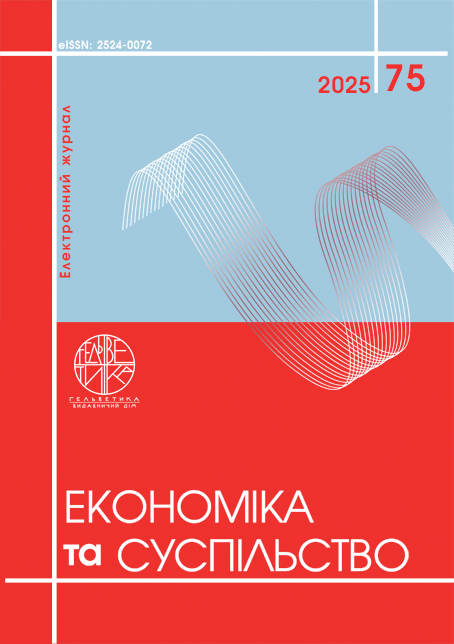РЕЗИЛЬЄНТНА SMART-ЕКОНОМІКА ЯК БАЗА ВІДНОВЛЕННЯ СОЦІАЛЬНО-ЕКОНОМІЧНОЇ СИСТЕМИ УКРАЇНИ
Анотація
У науковій статті доведена важливість поєднання Smart та резильєнтної моделей розвитку соціально-економічних систем (СЕС) різного рівня у межах нової резильєнтної smart моделі розвитку. Розкрито особливості формування і наслідки використання резильєнтної smart-економіки (РSЕ) для соціально-економічних систем різного рівня. На основі визначення сутності термінів «Smart-економіка» та «резильєнтна економіка» надано визначення сутності терміну «резильєнтна smart-економіка». Визначено переваги та недоліки концепції Smart-економіки та концепції резильєнтної економіки. Доведена необхідність переходу соціально-економічної системи України на резильєнтну smart модель розвитку. Визначено мету і завдання переходу на резильєнтну smart модель розвитку СЕС України. Визначено можливості використання резильєнтної smart-економіки для відновлення соціально-економічної системи України. Сформовано комплекс заходів переходу на резильєнтну smart модель розвитку соціально-економічної системи України.
Посилання
Peretto P.F. Industrial development, technological change, and long-run growth. Journal of Development Economics. 1999. Volume 59, Issue 2. Рр. 389-417.
Bell D. The Coming of Post-Industrial Society: A Venture in Social Forecasting. American Journal of Sociology. 1974. Volume 80, Issue 1. Рр. 230-242.
Al-Zoubi W. K. Economic Development in the Digital Economy: A Bibliometric Review. Economies. 2024. Volume 12(3). URL: https://www.mdpi.com/2227-7099/12/3/53 (дата звернення 03.06.2025).
Khan R.Z., Razak L.A., Premaratne G. Green growth and sustainability: A systematic literature review on theories, measures and future directions. Cleaner and Responsible Consumption. 2025. Volume 17. URL: https://www.sciencedirect.com/science/article/pii/S2666784325000257 (дата звернення 03.06.2025).
Thompson M. Social Economy and Social Enterprise. International Encyclopedia of Human Geography (Second Edition). 2020. Pр. 239-247.
Гріневська С.М. Соціоекономіка й соціальна орієнтація економіки: відмінності та спільні концептуальні основи. Український соціум. 2012. № 1(40). С. 141-150.
Eichengreen B., Park D., Shin K. Economic resilience: Why some countries recover more robustly than others from shocks. Economic Modelling. 2024. Volume 136. URL: https://www.sciencedirect.com/science/article/abs/pii/S0264999324001044 (дата звернення 03.06.2025).
Череватський Д.Ю. Резильєнтність економіки та економіка резильєнтності. Економіка промисловості. 2023. № 1 (101). С. 31-39.
Близнюк В., Шумська С., Бурлай Т., Борзенко О., Аргіріу А.-С. Резильєнтність соціально-економічної системи: стратегія і тактика мінімізації нерівностей українського суспільства. Журнал Європейської економіки. 2024. № 4 (91). Том 23. С. 583-602.
Лещух І.В. Еволюція теоретичних підходів до дослідження соціально-економічної резильєнтності країни та регіонів в умовах нестабільності. Економіка та суспільство. 2024. Випуск 61. URL: https://doi.org/10.32782/2524-0072/2024-61-50 (дата звернення 03.06.2025).
Frank E. and Fernández-Montesinos G.A. Smart City = Smart Citizen = Smart Economy? : An Economic Perspective of Smart Cities. 2020. URL: https://www.researchgate.net/publication/341805385_Smart_City_Smart_Citizen_Smart_Economy_An_Economic_Perspective_of_Smart_Cities (дата звернення 03.06.2025).
Arifah I.D.C., Safitri A., Fazlurrahman H., Chen G.K., Masrom A.N., Kharisma F. Smart Economy Implementation in Supporting SMEs Growth: Case Study in Indonesia & Malaysia Smart Cities. International Seminar on Research of Information Technology and Intelligent Systems (ISRITI). 2022. URL: https://ieeexplore.ieee.org/document/10053000 (дата звернення 03.06.2025).
Куцмус Н.М., Макаренко О.М. Концепція «smart-економіки» : виклики та перспективи для бізнесу в умовах глобалізації. Економіка та суспільство. 2024. Випуск 67. URL: https://doi.org/10.32782/2524-0072/2024-67-156 (дата звернення 03.06.2025).
Унінець І.М. Методичні підходи до оцінки смартекономіки. Соціальна економіка. 2020. Випуск 60. С. 47-54.
Peretto P.F. (1999) Industrial development, technological change, and long-run growth. Journal of Development Economics. Volume 59, Issue 2. Рр. 389-417.
Bell D. (1974) The Coming of Post-Industrial Society: A Venture in Social Forecasting. American Journal of Sociology. Volume 80, Issue 1. Рр. 230-242.
Al-Zoubi W. K. (2024) Economic Development in the Digital Economy: A Bibliometric Review. Economies. Volume 12(3). Available at: https://www.mdpi.com/2227-7099/12/3/53 (accessed June 3, 2025).
Khan R.Z., Razak L.A., Premaratne G. (2025) Green growth and sustainability: A systematic literature review on theories, measures and future directions. Cleaner and Responsible Consumption. Volume 17. Available at: https://www.sciencedirect.com/science/article/pii/S2666784325000257 (accessed June 3, 2025).
Thompson M. (2020) Social Economy and Social Enterprise. International Encyclopedia of Human Geography (Second Edition). Pр. 239-247.
Hrinevska S.M. (2012) Sotsioekonomika i sotsialna oriientatsiia ekonomiky: vidminnosti ta spilni kontseptualni osnovy [Socioeconomics and social orientation of the economy: differences and common conceptual foundations]. Ukrainskyi sotsium, no 1(40), pp. 141-150.
Eichengreen B., Park D., Shin K. (2024) Economic resilience: Why some countries recover more robustly than others from shocks. Economic Modelling. Volume 136. Available at: https://www.sciencedirect.com/science/article/abs/pii/S0264999324001044 (accessed June 3, 2025).
Cherevatskyi D.Yu. (2023) Rezylientnist ekonomiky ta ekonomika rezylientnosti [Economic resilience and the economics of resilience]. Ekonomika promyslovosti, no 1 (101), pp. 31-39.
Blyzniuk V., Shumska S., Burlai T., Borzenko O., Arhiriu A.S. (2024) Rezylientnist sotsialno-ekonomichnoi systemy: stratehiia i taktyka minimizatsii nerivnostei ukrainskoho suspilstva [Resilience of the socio-economic system: strategy and tactics for minimizing inequalities in Ukrainian society]. Zhurnal Yevropeiskoi ekonomiky, no. 4 (91), vol. 23, pp. 583-602.
Leshchukh I.V. (2024) Evoliutsiia teoretychnykh pidkhodiv do doslidzhennia sotsialno-ekonomichnoi rezylientnosti krainy ta rehioniv v umovakh nestabilnosti [Evolution of theoretical approaches to the study of socio-economic resilience of the country and regions in conditions of instability]. Ekonomika ta suspilstvo, no 61. Available at: https://doi.org/10.32782/2524-0072/2024-61-50 (accessed June 3, 2025).
Frank E. and Fernández-Montesinos G.A. (2020) Smart City = Smart Citizen = Smart Economy? : An Economic Perspective of Smart Cities. Available at: https://www.researchgate.net/publication/341805385_Smart_City_Smart_Citizen_Smart_Economy_An_Economic_Perspective_of_Smart_Cities (accessed June 3, 2025).
Arifah I.D.C., Safitri A., Fazlurrahman H., Chen G.K., Masrom A.N., Kharisma F. (2022) Smart Economy Implementation in Supporting SMEs Growth: Case Study in Indonesia & Malaysia Smart Cities. International Seminar on Research of Information Technology and Intelligent Systems (ISRITI). Available at: https://ieeexplore.ieee.org/document/10053000 (accessed June 3, 2025).
Kutsmus N.M., Makarenko O.M. (2024) Kontseptsiia «smart-ekonomiky»: vyklyky ta perspektyvy dlia biznesu v umovakh hlobalizatsii [The concept of "smart economy": challenges and prospects for business in the context of globalization]. Ekonomika ta suspilstvo, no 67. Available at: https://doi.org/10.32782/2524-0072/2024-67-156 (accessed June 3, 2025).
Uninets I.M. (2020) Metodychni pidkhody do otsinky smartekonomiky [Methodological approaches to assessing smart economy]. Sotsialna ekonomika, no 60, pp. 47-54.

Ця робота ліцензується відповідно до Creative Commons Attribution 4.0 International License.


